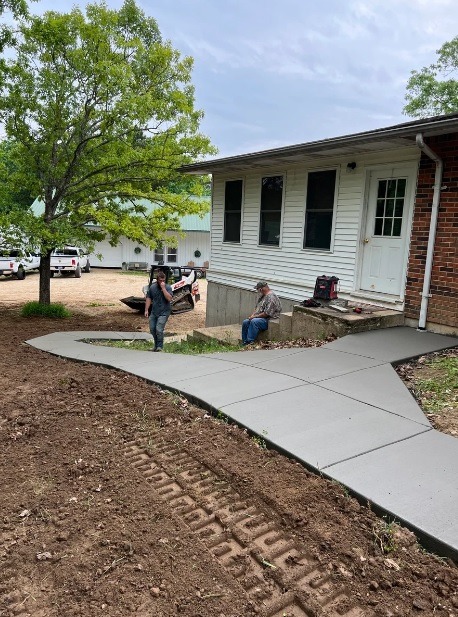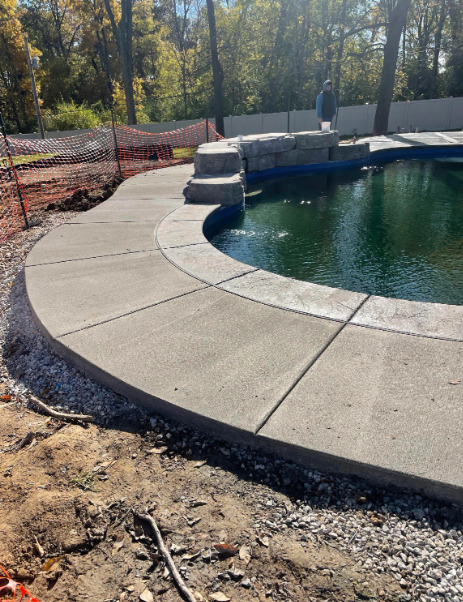#Stamped concrete builder
Text
Concrete contractor
Clark Concrete Works is a concrete contractor in Rochester NY. Whether you're looking to spruce up your backyard with a new patio, upgrade your driveway to concrete, or have a new slab poured for a building, we are here to help! Call today for a free estimate on your next concrete project.
Clark Concrete Works
Address: 55 Weldon Street Unit #2, Rochester NY, 14611
Phone: (585) 440-7270
Email: [email protected]
Visit us
#Rochester NY concrete contractor#Concrete company rochester#Commercial concrete rochester ny#Clark Concrete Works#Concrete Contractor in Rochester NY#Concrete rochester#Webster NY concrete#Concrete in greece ny#Concrete driveway repair rochester#Stamped concrete builder#Foundation contractor in rochester#Rochester concrete patio installation#New concrete slab foundation#Concrete company near me#Concrete hot tub pad#Decorative concrete contractor
1 note
·
View note
Text
Concrete Driveway Installation Contractor in St. Peters, MO
Find the best concrete driveway installation contractor in St. Peters, MO. A concrete driveway can last for many years and can be customized to fit the style of any home.

#Concrete driveway installation contractor in St. Peters MO#Concrete sidewalk repair services in St. Charles MO#Concrete patio builder near me in Ofallon MO#Retaining wall construction companies in Wighaven MO#Flatwork concrete services in Wentzville MO#Stamped concrete driveway installation in St. Paul MO#Stained concrete patio contractor in Cottleville MO#Colored concrete walkway builder in St. Charles County#Concrete overlay installation services near St. Peters MO#Concrete resurfacing contractor near St. Charles MO#Concrete curbing installation companies in Maryland Heights MO
0 notes
Photo

Tropical Pool (Brisbane)
#Ideas for remodeling a medium-sized tropical front yard with stamped concrete and a specially-designed natural water slide pool design#design#pool builder brisbane#water feature#award
0 notes
Photo

Dallas Patio Stamped Concrete
#Ideas for a medium-sized redesign of a tropical backyard stamped concrete patio outdoor dining#deck#covered patio#stamped concrete#custom#builder
0 notes
Photo

Contemporary Pool - Lap
#Example of a large trendy backyard stamped concrete and rectangular lap pool design pool#home builders in hawaii#concrete floors#green home builders#indoor-outdoor living#hawaii
0 notes
Photo

Natural Pool in Dallas
#Photo of a sizable backyard fountain in the shape of an island with stamped concrete aqua#palm trees#waterfall#animal planet the pool master#luxury swimming pool#swimming pool builder#tiki hut
0 notes
Photo

Traditional Patio - Roof Extensions
#Image of a medium-sized#elegant stamped concrete patio in the backyard with a fireplace and a roof extension outdoor dining#covered patio#pergola#patio covers#patio#builders
0 notes
Photo

Outdoor Kitchen Outdoor Kitchen in Grand Rapids
#Large elegant backyard stamped concrete patio kitchen photo with a pergola caron custom homes#outdoor kitchen#home builders#outdoor speakers#speakers outdoor#outdoor kitchens
1 note
·
View note
Photo

Austin Infinity
#An enormous transitional backyard with stamped concrete and a specially designed infinity pool fountain is an example. custom homes#custom homebuilders san antonio#san antonio custom home builders#tx hill country builders#san antonio custom builders
0 notes
Photo

Pool (Brisbane)
#Water slide - mid-sized tropical front yard stamped concrete and custom-shaped natural water slide idea water feature#pool#pool builder brisbane#best pool#inground pool#swimming#spasa
0 notes
Photo

Pool Water Slide in Brisbane
#Water slide - mid-sized tropical front yard stamped concrete and custom-shaped natural water slide idea tropical#spa#pool house#design#pool builder brisbane
0 notes
Photo

Austin Porch Backyard
#Large mountain style stamped concrete screened-in back porch photo with a roof extension joco builders#joco#luxury#central texas#stucco
1 note
·
View note
Text
Concrete Pool Deck Builder Near Me
Finest Concrete is the perfect choice for concrete pool deck builder near me, We provide a variety of services and are more than just another concrete company, which sets us apart from other concrete companies, customer satisfaction is our goal for every project.

#Concrete driveway installation contractor in St. Peters MO#Concrete sidewalk repair services in St. Charles MO#Concrete patio builder near me in Ofallon MO#Retaining wall construction companies in Wighaven MO#Flatwork concrete services in Wentzville MO#Stamped concrete driveway installation in St. Paul MO#Stained concrete patio contractor in Cottleville MO#Colored concrete walkway builder in St. Charles County#Concrete overlay installation services near St. Peters MO#Concrete resurfacing contractor near St. Charles MO#Concrete curbing installation companies in Maryland Heights MO#Decorative concrete contractor for patios in Clayton MO
0 notes
Photo

Porch - Backyard
#Idea for a large#mountain-style#stamped-concrete screened-in back porch with an addition to the roof porch#ranch#texas custom home#country house#rustic ranch#joco builders#enclosed patio
0 notes
Photo

Pool Infinity
#Pool fountain - huge transitional backyard stamped concrete and custom-shaped infinity pool fountain idea beautiful pools#homebuilders san antonio#custom homebuilders san antonio#custom builders san antonio#tx hill country builders#gruene river lodge
0 notes
Text
Understanding Mini Concrete: Revolutionising Small-Scale Construction

In recent years, the construction industry has witnessed a significant evolution in materials and methodologies, one of which is the increasing popularity of mini concrete. Innovatively, this trend primarily focusing on small-scale applications, has emerged as an efficient solution for various projects, from residential construction to small infrastructure works. Let’s further discover the unique characteristics, advantages, applications, and future prospects of mini concrete, particularly in Australia.
Introducing Mini Concrete
Ideally, mini concrete, often referred to as lightweight concrete, is a form of concrete characterised by its reduced weight and volume. While traditional concrete typically involves a combination of sand, gravel, water, and cement, mini concrete integrates lightweight aggregates, such as expanded clay, pumice, or polystyrene beads, resulting in a product that maintains structural integrity while being significantly lighter. This type of concrete can be used in various applications where weight reduction is essential without compromising durability and strength.
Advantages of Mini Concrete
One of the most prominent advantages of mini concrete is its lightweight nature. This quality leads to several benefits, particularly in smaller construction projects or urban environments where heavy equipment may not easily access the site. The reduced weight means lower transportation costs, easier handling, and quicker installation times.
Additionally, mini concrete often boasts superior insulation properties due to the air pockets created by its lightweight aggregates. This feature contributes to energy efficiency, making buildings warmer in winter and cooler in summer, significantly reducing heating and cooling costs.
Furthermore, mini concrete is highly versatile, lending itself to various applications. Its flexibility in mixing allows for a broad range of uses, from decorative elements in landscaping to structural components in residential buildings. The material can be easily moulded into various shapes and sizes, making it ideal for custom projects.
And lastly, because mini concrete can be applied in thin layers, it requires less material overall. This advantage contributes to sustainability which is a core consideration in modern construction. Not only construction industry will benefit but the environment as well.
Applications of Mini Concrete
The applications of mini concrete are diverse and continue to expand as construction needs evolve, particularly in Australia. One of the most common uses is in residential construction, where it is employed for non-load-bearing walls, flooring systems, and decorative elements. The lightweight nature allows for innovative design choices, enabling homeowners and builders to create unique aesthetics without a significant increase in structural weight.
Additionally, mini concrete also finds significant applications in landscaping. The material's ease of manipulation allows for the crafting of garden features, pathways, and retaining walls that are not only functional but also visually appealing. The use of mini concrete in outdoor settings often incorporates a variety of finishes, including stamped, stained, or polished surfaces, catering to diverse aesthetic preferences.
Furthermore, mini concrete can also be applicable in precast applications. Prefabricated components, such as panels and blocks, can be manufactured off-site using mini concrete, allowing for quicker assembly on-site. This method is particularly attractive for urban development where time is often of the essence, and minimising disruption is a priority.
Visions of Mini Concrete
These days, research and development are ongoing to enhance its properties further, focusing on improving strength, durability, and environmental sustainability. Innovations in mixing technologies and the incorporation of recycled materials could position mini concrete as a leading choice in eco-friendly construction. As well, with the growing emphasis on sustainable building practices, mini concrete aligns well with regulatory trends aimed at reducing the carbon footprint of construction projects. Its lightweight nature not only conserves resources but also opens doors for sustainable transport and reduced energy consumption during construction.
0 notes